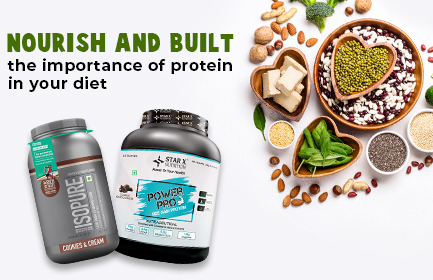Copyright © 2024, supplementsvilla.com

24 Jul 2024 HEALTH TIPS
Imagine your body as a magnificent temple. Protein is the essential building block, the bricks and mortar that make this temple strong and functional. Just as a strong foundation is essential for a healthy system, protein is essential for building and repairing muscles, bones and tendons throughout your life.
Protein is not important only for our physical strength but also plays vital role in each and every function of body from producing hormones and enzymes to making you feel full and energized. For nourishment of our body protein intake is very essential and we cannot negotiate on that.
What is Protein?
Proteins are large, complex molecules made up of amino acids, which are the building blocks of life. These amino acids are linked together in various sequences to form proteins, which then perform a multitude of functions within the body. There are 20 different amino acids, nine of which are considered essential because our bodies cannot produce them on their own – meaning they must be obtained through our diet.
Benefits of a Protein:
Muscle Building and Repair: Protein is very important for building and maintaining muscle mass. This is essential for those who are active, trying to gain muscle, or counteract the natural decline in muscle mass that happens as we get older.
Feeling Full and Satisfied: Compared to eating the same amount of calories from carbohydrates or fat, protein makes you feel full longer, keeping you full longer and reducing cravings. This may be beneficial for weight control or just maintaining a healthy energy balance.
Boosts Metabolism: Body burns calories at some point of digestion, and protein takes extra energy to digest, take in, and utilize that nutrient in comparison to different vitamins. This means it takes more strength to procedure, leading to a slightly extended metabolism.
How Much Protein Do You Need?
The amount of protein you need depends on various factors such as age, sex, weight, and activity level. The Recommended Dietary Allowance (RDA) for protein is 46 grams per day for women and 56 grams per day for men. However, individuals who are highly active, pregnant or breastfeeding, or trying to build muscle may require more.
Sources of Protein
Protein can be obtained from a variety of plant-based sources. Here are some excellent vegetarian options:
Nuts and Seeds: Almonds, walnuts, chia seeds, flaxseeds, and pumpkin seeds offer protein, healthy fats, and essential nutrients.
Tofu and Tempeh: Made from soybeans, these versatile foods are rich in protein and can be used in various dishes.
Whole Grains: Quinoa, barley, brown rice, and whole wheat provide protein along with complex carbohydrates and fiber.
Dairy Products: Greek yogurt, cottage cheese, and milk are excellent sources of protein for vegetarians.
Whey Protein: Whey protein, derived from milk, is a highly effective and convenient protein supplement, especially for those who need to boost their intake or support muscle recovery after workouts.
Balancing Protein in Your Diet
It’s important to balance your protein intake with other macronutrients such as carbohydrates and fats. A well-rounded diet that includes a variety of nutrient-dense foods will ensure you’re getting all the essential nutrients your body needs. Here are some tips for incorporating protein into your diet:
Start your day with protein: Include Greek yogurt, a protein smoothie with whey, or oatmeal topped with nuts and seeds in your breakfast.
Snack smart: Choose protein-rich snacks like hummus with veggies, brocolli, a handful of nuts, or a whey protein shake.
Mix it up: use combination of different plant protein sources for a diverse nutrient intake.
Post-workout protein: Have a whey protein shake or a protein-rich meal with lentils or tofu after exercise to aid muscle recovery.
Conclusion
Protein helps in nourishing and building our bodies. From fueling our muscles to supporting our immune system, it's a crucial component of a healthy diet. By understanding its importance and incorporating various protein sources into your meals, you can empower your body to function at its best.